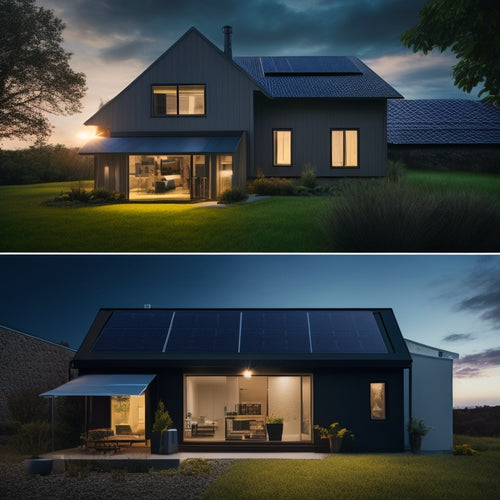
Home Battery Packs Benefits for Your Wallet
Share
Home battery packs can dramatically benefit your wallet by reducing energy costs. They store energy during off-peak hours, allowing you to use it during peak demand, which can lower your monthly electricity bill by up to 30%. Additionally, you can sell excess energy back to the grid, enhancing your financial flexibility. With an average payback period of five to seven years and federal tax credits available, the initial investment translates into long-term savings. Choosing a unit with over 90% efficiency further maximizes these gains. To uncover more about optimizing your energy expenses, you might want to investigate additional understandings.
At a Glance
- Home battery packs can reduce monthly energy costs by up to 30% by utilizing stored energy during peak demand periods.
- Federal tax credits and local rebates can significantly lower the installation costs, enhancing financial benefits.
- Participation in demand response programs allows homeowners to sell excess energy back to the grid, providing additional savings.
- Higher efficiency systems retain up to 90% of stored energy, minimizing operational costs and maximizing savings over time.
- Actual case studies show payback periods of five to seven years, equating battery investment to long-term financial health.
Cost-Effective Energy Storage Solution
Investing in home battery packs can greatly reduce your electricity bills by allowing you to store energy during off-peak hours for later use.
Many homeowners may also qualify for various incentives and rebates, making this energy storage solution even more cost-effective.
Reducing Electricity Bills
Many homeowners are uncovering that home battery packs can greatly reduce electricity bills by optimizing energy consumption. By storing energy during off-peak hours, you can employ that stored energy during peak demand times, effectively engaging in peak shaving.
This strategy minimizes your reliance on grid power when it's most expensive, leading to significant cost savings.
Moreover, your home battery can participate in demand response programs, allowing you to sell excess stored energy back to the grid during high-demand periods. This not only reduces your electricity bills but also contributes to a more stable energy grid.
Data shows that households using battery packs can reduce their monthly energy costs by up to 30%.
This reduction translates into substantial annual savings, providing you with more financial flexibility.
Incentives and Rebates Available
How can homeowners maximize their investment in home battery packs? One effective strategy is to take advantage of the various incentives and rebates available. The federal tax credit for residential energy storage systems allows you to deduct a considerable percentage of the installation costs from your federal taxes. Currently, this credit stands at 30%, making it a substantial financial enhancement that can offset the initial expense of your battery system.
In addition to federal tax credits, many local programs offer further incentives. These can include rebates, low-interest financing, or even performance-based incentives for energy storage systems.
For instance, some states have established programs that reward homeowners for reducing grid reliance, enhancing your potential savings considerably.
Long-Term Savings on Electricity
Installing a home battery pack can greatly reduce your energy bills by storing excess energy for later use. By utilizing stored energy during peak hours, you can avoid higher rates and maximize savings.
Furthermore, home battery storage systems enhance energy efficiency and independence, allowing you to utilize renewable energy effectively, leading to long-term financial benefits energy independence.
Additionally, various government incentives can further improve your financial benefits, making this investment even more appealing.
Reduced Energy Bills
Over time, homeowners who invest in home battery packs often see a significant reduction in their energy bills. By capturing and storing energy during off-peak hours, you can avoid the high costs associated with peak demand periods. This strategy not only lowers your monthly expenses but also enhances your energy independence.
Data shows that households using home battery systems can save an average of 20-30% on their electricity bills, depending on local energy rates and usage patterns. When your battery discharges stored energy during peak hours, you're fundamentally utilizing free energy, which translates to substantial savings over time.
Additionally, as energy prices continue to rise, having a home battery pack can act as a buffer against fluctuating rates. You'll be less vulnerable to grid price hikes, allowing you to manage your energy costs effectively.
Incorporating a battery system into your home not only supports your financial goals but also contributes to a sustainable future. By investing in this technology, you're taking control of your energy consumption and setting the stage for long-term savings, all while enjoying greater autonomy and reduced reliance on traditional energy sources.
Government Incentives Available
Home battery packs not only offer immediate savings on energy bills but can also be enhanced by various government incentives. By taking advantage of federal programs and local grants, you can greatly reduce the overall cost of your home energy system, leading to long-term savings.
Here's a quick overview of some incentives you might qualify for:
| Incentive Type | Description | Potential Savings |
|---|---|---|
| Federal Tax Credit | A tax credit for renewable energy systems | Up to 26% of installation costs |
| State Rebates | Cash rebates offered by your state | Varies by state |
| Local Grants | Financial assistance for energy projects | Can cover up to 50% |
| Utility Incentives | Discounts for reducing energy consumption | Monthly bill reductions |
Utilizing these options can not only lighten your upfront costs but also secure a more sustainable energy future. By exploring these incentives, you're not just investing in your home—you're gaining freedom from fluctuating energy prices and increasing your financial independence. Don't miss out on these opportunities; they can be the key to releasing substantial savings.
Key Specifications Overview
When considering home battery packs, you'll want to focus on their capacity and storage options, as these directly impact your energy independence.
Understanding solar battery needs and types can help you choose the right system for your home.
Efficiency ratings play an essential role in determining your potential cost savings over time.
Capacity and Storage Options
Understanding capacity and storage options is essential for optimizing your energy management system. When you consider home battery packs, you'll encounter various capacity types that determine how much energy your system can store. Typically measured in kilowatt-hours (kWh), these capacities can range from small units of 5 kWh to larger systems exceeding 20 kWh.
Choosing the right capacity depends on your energy consumption patterns and goals for independence.
Storage technologies also play an essential part. Lithium-ion batteries are the most common due to their high energy density and longer lifespan, often lasting over 10 years. However, other options like lead-acid or saltwater batteries exist, each with their own advantages and drawbacks.
For instance, while lead-acid batteries may be less expensive upfront, they generally have shorter lifespans and lower depth of discharge.
To maximize your investment, analyze your energy needs and evaluate the storage technologies that align with your lifestyle. By understanding these capacity types and storage technologies, you give yourself the ability to make informed decisions that enhance your freedom and reduce reliance on traditional energy sources.
Efficiency and Cost Savings
Maximizing efficiency and cost savings with home battery packs hinges on several key specifications that directly impact performance and return on investment.
First, consider the battery technology used. Lithium-ion batteries typically offer higher energy density and longer lifespans compared to alternatives, enabling you to store more energy in less space while reducing replacement costs over time.
Next, assess the round-trip efficiency, which measures how much energy you can use from the battery compared to what you put in. Higher efficiencies mean more savings, as you'll waste less energy during charging and discharging cycles. Aim for systems with efficiencies above 90%.
Renewable integration is another vital factor. Effective home battery packs seamlessly connect with solar panels or wind systems, allowing you to maximize your use of renewable energy, greatly cutting down on grid reliance.
Furthermore, evaluate the discharge rate. A higher discharge rate allows you to meet sudden energy demands without straining the system, optimizing your overall energy management.
Selecting Based on Energy Capacity
When selecting a home battery pack, understanding your energy storage needs is essential for making an informed choice.
You'll need to evaluate various battery capacity options to determine which aligns with your household's consumption patterns and backup requirements.
Considering factors such as top-rated grid tie batteries can greatly impact your energy independence and cost savings over time.
This analysis can greatly impact your energy independence and cost savings over time.
Understanding Energy Storage Needs
Selecting the right energy storage solution is crucial for effectively managing your power needs. By understanding your energy consumption and selecting from various battery technologies, you can achieve true energy independence. The capacity of a battery pack determines how much energy it can store and supply during outages or high demand periods.
To make an informed choice, consider the following factors:
| Factor | Importance |
|---|---|
| Daily Energy Usage | Helps determine the required storage capacity. |
| Peak Demand | Identifies the maximum energy you might need. |
| System Compatibility | Guarantees the battery works with your existing setup. |
| Future Expansion | Allows for potential upgrades or additional needs. |
Evaluating Battery Capacity Options
After understanding your energy storage needs, the next step involves evaluating battery capacity options to confirm they align with your consumption patterns.
Start by determining how much energy you consume daily, which is often measured in kilowatt-hours (kWh). This metric helps you choose a battery that can effectively meet your needs without overextending your budget.
When comparing capacity options, consider battery longevity. A higher capacity may seem appealing, but it's crucial to assess how long the battery will last under your typical usage. For instance, a battery with a capacity of 10 kWh may suffice for a household that uses 30 kWh daily, allowing for three days of backup power if necessary.
However, remember that battery efficiency can vary based on chemistry and design. Lithium-ion batteries tend to offer better longevity and performance compared to lead-acid counterparts.
Conduct a capacity comparison by evaluating both the upfront costs and lifespan of different batteries. This analysis guarantees that you select a battery that not only meets your current needs but also provides long-term savings and freedom from fluctuating energy prices.
Higher Efficiency Ratings
When you choose home battery packs with higher efficiency ratings, you can greatly reduce your energy costs.
These systems convert and store energy more effectively, leading to less waste and more usable power.
Energy Cost Savings
Home battery packs can greatly reduce your energy costs by leveraging higher efficiency ratings. When you integrate these systems with solar panels, you optimize energy capture and usage, markedly lowering your electricity bills. Research indicates that homes utilizing this solar integration can save up to 50% on their energy costs over time.
Moreover, higher efficiency ratings mean that less energy is lost during storage and usage, translating to more savings in your wallet. For instance, a battery system operating at 90% efficiency retains more energy compared to lower-rated alternatives.
The quest for grid independence becomes more achievable with these advanced battery technologies. By storing excess solar energy, you can power your home during peak hours when electricity rates are highest, allowing you to sidestep costly grid dependency.
This financial freedom isn't just theoretical; actual case studies show homeowners experiencing payback periods of five to seven years on their investments, leading to long-term savings.
Fundamentally, by choosing higher efficiency battery packs, you're not just investing in energy; you're investing in your financial future.
Frequently Asked Questions
How Do Home Battery Packs Impact Property Value?
Home battery packs can enhance your property investment by increasing energy independence. They attract eco-conscious buyers, potentially raising your home's market value. Their presence signals sustainability, appealing to those seeking freedom from traditional energy sources.
Can I Install a Battery Pack Myself?
Imagine building a fortress. You can undoubtedly attempt DIY installation of a battery pack, but remember safety considerations. Weigh your skills against potential risks; sometimes, expert hands craft sturdier walls than our own.
What Happens During a Power Outage?
During a power outage, you experience disruptions that challenge your daily routines. You'll rely on energy resilience to maintain essential functions until power restoration occurs, allowing you to regain control and independence in your environment.
Are There Government Incentives for Home Battery Installation?
When you utilize the sun's power, you're not just saving energy; you're accessing federal tax credits and state rebates. These incentives can enhance your energy independence and support renewable energy, making your future brighter and freer.
How Do Battery Packs Affect My Energy Bill?
Battery packs can lower your energy bill by enabling energy savings through peak shifting. You store energy during off-peak hours and use it during peak times, reducing your reliance on expensive grid power and enhancing your independence.
Explore More
Incorporating a home battery pack is like investing in a high-yield savings account for your energy needs. You're not just storing power; you're strategically lowering your electricity bills over time. Studies show homeowners can save upwards of 30% on energy costs annually with these systems. By selecting the right specifications and efficiency ratings, you're choosing to secure your financial future while contributing to sustainable energy practices. It's a smart decision that pays off both now and in the long run.
Related Posts
-

A Beginner's Guide to Navigating the Solar Investment Tax Credit
You're eligible to claim a significant Solar Investment Tax Credit (ITC) of 30% of total installation costs, but mane...
-

Diy Off Grid Solar
By embracing DIY off-grid solar, you can break free from grid dependence, slashing your energy bills by up to 90% and...
-

Cost of Home Solar Battery
You're looking to invest in a home solar battery to reduce your grid reliance, but you're curious about the cost. The...


